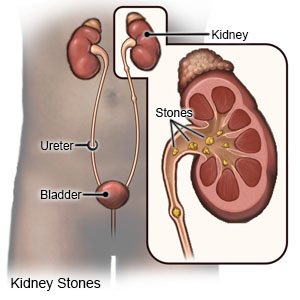Lithotripsy
Medically reviewed by Drugs.com. Last updated on Apr 6, 2025.
What do I need to know about lithotripsy?
Lithotripsy is a procedure that uses sound waves to break up stones in the kidney, ureter, or bladder. The stone pieces then pass out of your body through your urine.
 |
How do I prepare for a lithotripsy?
- Your healthcare provider will tell you about how to prepare for the procedure. Your provider may tell you not to eat or drink anything after midnight before your procedure. Arrange to have someone drive you home after the procedure.
- You may need to stop taking any medicines that thin your blood 1 week or more before your procedure. These medicines include aspirin, ibuprofen, and anticoagulants.
- Your provider will tell you which medicines to take or not take on the day of your procedure.
Drugs used to treat this and similar conditions
Potassium citrate
Potassium information from Drugs.com, includes potassium side effects, interactions and indications.
What will happen during lithotripsy?
- You may be given medicine to keep you relaxed and pain-free during the procedure. You may instead be given general anesthesia to keep you asleep during the procedure.
- X-rays or an ultrasound are used to find the kidney stone. You may lie on a cushion filled with water or sit in a bath of warm water. High-energy sound waves are aimed at your kidney stone. The sound waves break the stone into tiny pieces. You will pass these pieces in a few days when you urinate.
- A stent (tube) may be put into your kidney or ureter through your bladder or back. The stent helps the pieces of stone pass out of your body.
What should I expect after a lithotripsy?
- You may have blood in your urine for 1 to 2 days.
- You may have bruising and discomfort in your back or abdomen. These should get better within a few days.
- You will need to strain your urine to help you find pieces of stone as you pass them. This may happen over a few weeks. Your healthcare provider will show you how to strain your urine.
- You may have pain whenever you pass pieces of your kidney stone.
- If a stent was placed, your provider will tell you when to return to have it taken out.
- Your provider may tell you to avoid some activities for a few days as you heal.
What are the risks of a lithotripsy?
You may develop bleeding around your kidney or get a kidney infection. The pieces of stone may block the flow of urine from your kidney. You may need another lithotripsy, or other procedure, if pieces of stone are left in your body. You may develop a stomach or intestine ulcer. Your kidney may not work correctly after the procedure. Your kidney may stop working completely. This can be life-threatening.
Care Agreement
You have the right to help plan your care. Learn about your health condition and how it may be treated. Discuss treatment options with your healthcare providers to decide what care you want to receive. You always have the right to refuse treatment. The above information is an educational aid only. It is not intended as medical advice for individual conditions or treatments. Talk to your doctor, nurse or pharmacist before following any medical regimen to see if it is safe and effective for you.© Copyright Merative 2025 Information is for End User's use only and may not be sold, redistributed or otherwise used for commercial purposes.
Further information
Always consult your healthcare provider to ensure the information displayed on this page applies to your personal circumstances.
